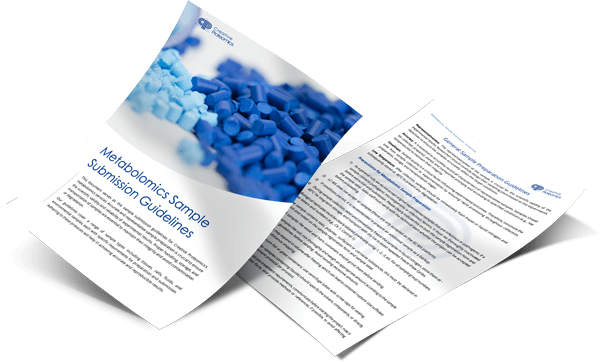Gas chromatography-mass spectrometry (GC-MS) untargeted metabolomics detects the dynamic changes of most small molecule metabolites in the body before and after the external stimuli. This method focuses on identifying the metabolites with significant changes between the experimental and control groups.
The GC-MS untargeted metabolomics developed by Creative Proteomics is an effective method for both qualitative and quantitative analysis of unknown compounds in mixtures. It can be used for determining the molecular structure and accurate molecular weight of compounds, making it suitable for trace analysis of drugs and metabolites in biological samples and body fluids. The method allows for direct qualitative and quantitative analysis of volatile components, and for non-volatile components and thermally unstable substances, suitable derivatization can be performed before analysis. With high sensitivity, qualitative ability, stability, and reliability, this method can simultaneously complete the separation and identification of the components to be measured.
GC-MS is widely used in metabolomics due to its highly standardized application of electron ionization, which enables the production of extensive and highly reproducible fragmentation patterns. These patterns can provide valuable information for the characterization of metabolites or compound species, even in cases where the obtained mass spectrometry data are not available in the database.
Workflow of GC–MS-based Untargeted metabolomic Analysis
 Figure:Workflow of GC–MS-based untargeted metabolomic analysis of urine.
Figure:Workflow of GC–MS-based untargeted metabolomic analysis of urine.
Source (Mohammad Khodadadi et al., Metabolomics 16(6):66 2020)
Application
- Phenotype and physiological function research
- Disease Pathology Research
- Clinical diagnosis and treatment
- Drug research
- Traditional Chinese medicine research
- Food science and nutrition research
- Livestock and agroforestry research
- Environmental Toxicology Research
Technical Advantages
- Mature and stable technology, high resolution and good selectivity
- Have a relatively complete database
- Suitable for the analysis of complex matrix, providing comprehensive information in one analysis
- Automatic peak identification, deconvolution, sample comparison, quality control
- Qualitative is more accurate
Service Features
Self-built Database
Using open source databases and self-built database qualitative, the database is mature, and the structure is qualitatively reliable
Strict QC
Adopt the most stringent QC system to ensure the qualitative and quantitative results of each project
Advanced Platform
Using Agilent 7890B-5977A platform with high sensitivity, strong qualitative ability, stable and reliable
Wide Dynamic Range
Different processing methods are conducive to the detection of small molecules with various properties, covering multiple categories of metabolites such as amino acids, organic acids, carbohydrates, fatty acids, lipids, nucleotides, and polyamines
Different Approaches:
1. Derivatization is suitable for detecting small molecular metabolites with strong polarity;
2. Non-derivatization is suitable for detecting small molecule metabolites with lower boiling points;
3. Solid-phase microextraction-headspace sampling is suitable for detecting volatile aroma or flavor substances.
Sample Requirements
Serum, plasma: 200 uL/sample
Urine: l mL/sample
Tissue: 200 mg/sample
Stool, intestinal contents: 200 mg/sample
Cells, microorganisms: 1x 107cells/sample
Culture fluid: 200 uL/sample
Biological Repeats
Number of samples: plant and microorganism n≥6, animal samples n≥10, clinical samples n≥30
Instrumentation
Aglient 7890B-5977A; Agilent 7890B-5977B (headspace); Thermo TSQ 9000





